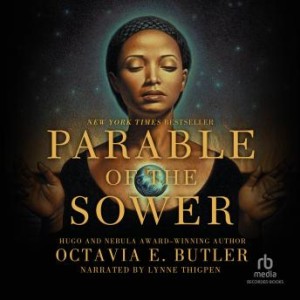
This 1993 novel begins in the then-distant future of 2024, which startled me at first. Due to her mother’s drug abuse while pregnant, teenager Lauren Olamina actually feels all the sensations she witnesses in others. She calls it “sharing” and finds it a liability in her world.
She and her father, stepmother and young siblings live in a gated community ten miles outside Los Angeles. It is not just gated but fortified against the collapsing society outside, where dire poverty is rampant, services have mostly collapsed, and police and firefighters cannot be trusted. Gangs run amok, many high on a drug that makes them delight in setting fires and killing people.
Lauren comes to the conclusion that society will fail even further and their frail walls will not be able to keep out the mobs who want even the small affluence they have: vegetable gardens, acorns they’ve collected for flour, a sewing machine. She begins to train herself in how to survive, everything from recognising edible wild plants to firing a gun. But her “sharing” means that it is easy to incapacitate her, simply by hurting someone in front of her.
She creates her own belief system, which she calls Earthseed, based on the idea that the only reliable truth is that “God is Change.” Given that, then humanity can shape God. All of her preparations are needed when their fortifications are breached three years later, and she sets out to find a place to regroup and recreate a community.
At first I found this book almost impossible to read. Not because of anything wrong with the book, but because of my own despair. Such a future seems only too likely, maybe not in the next two years, but not that far off. Too many groups today are threatening civil war, and boasting that they are the ones with guns.
Then I remembered the early 1970s. Society seemed to be falling apart in the wake of assassinations, corruption, the Vietnam debacle. My partner pointed out the fragility of supply chains—something the pandemic has brought home to all of us fifty years later. Like many of those who jumped on the back-to-the-land movement at the time, he was motivated less by a desire to be closer to nature and more by wanting to be self-sufficient if—when—the social order imploded.
It didn’t. The country pulled through, damaged and deeply flawed, but holding.
This book felt so real to me, as though it were all happening right now. Just as I despaired in the beginning, I began to hope as Lauren built her community, one person at a time, one kindness at a time.
Have you read this book? What did you think of it?